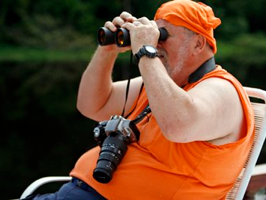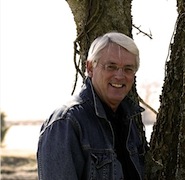 Technically it’s no longer bird watching, it’s birding. I don’t know that there’s a big difference, but birders are pretty sensitive types, and I, for one, don’t want to get on their wrong side of one.
Technically it’s no longer bird watching, it’s birding. I don’t know that there’s a big difference, but birders are pretty sensitive types, and I, for one, don’t want to get on their wrong side of one.
To answer my own question; I don’t know why I do it. Furthermore, if you would have accused me forty or thirty or even ten years ago of becoming a bird watcher (birder) I would have guffawed and maybe taken a swing at you. BTW, in the UK, birders are called twitchers, but we all know they have a tough time with the King’s english. I am, and I do, watch birds that is. Worse yet, I try, mostly in vain, to take photographs of them. They are harder to get in focus than your average grandkid who missed his dose of ritalin. Before I go any further with this inquiry, some facts are in order.
Birding, birdwatching, or twitching is the largest participant sport in the world. What!!! No way!!! What about soccer/football, you say? Or track and field or fishing. Nope here’s the facts. Other than birding, soccer is by far the largest with two hundred forty million registered players worldwide, but in North America alone there were sixty million birders in 1980. You extrapolate that to the rest of the world, particularly to Europe where it’s even more popular, and you come up with a number of, give or take, 600 million. Don’t fight the math. I’m right. So I’m a member of a very large sporting fraternity. There are about ten thousand known species of birds in the world, nine hundred twenty five in the US and Canada, six hundred twenty in Texas, and one hundred twelve at Lyday Farms (my personal birding domain). So we’re also a very global activity.
North Americans spent roughly thirty billion dollars on birding activities and equipment, which is one of the reasons I like birding. You can spend as much as you want on gadgets and still find other stuff you just “have to have”. Guide books by the thousands, binoculars that are light as feathers and which can see feathers clearly even in low light hundreds of yards away, spotting scopes of extraordinary magnification, bird houses, bird feeders, bird feed, digital recordings of bird calls, cameras, tripods, monopods, camera lenses, bird art and on and on and on. Then there’s travel. Most birders, sooner are later, tire of the birds right around them and seek out new climes to spot new species. There are travel agencies that specialize in group or custom birding trips to everywhere from the Aleutian Islands to Zanzibar and everywhere in between. Or there are people like me that just add on a day or two of birding wherever they go in the world. It’s on these trips that I was introduced to bird guides…the human kind. These are an unusual breed of human. They are, of course, expert in their field of endeavor and can identify birds by sight, sound or even flight pattern. They are in tune with nature and the natural world in a way that you or I can only aspire to. They are conservationists and active stewards of the earth and all it’s inhabitants, and they, most importantly, are very happy doing what they do. I’ve never met a bad or a mean bird guide. I wish I could say that about any other profession.
My first encounter focusing on birds, other than when as a twelve year old I tried to shoot turkey vultures on the wing with my .22 and kill sparrows with my slingshot, was in Africa. S. and I had added a safari in the Krueger National Park to our tour. The Krueger is a vast habitat of pretty much every species of animal in South Africa including the elusive big five (rhino, leopard, lion, water buffalo, and elephant). S. and I were fortunate to spot all five within the first twenty four hours of our visit, and I quickly concluded that once you’ve seen one elephant in the wild, you’ve pretty much seem them all. Kind of like cathedrals in France. But birds were different. They were everywhere and each was different from the other. The magnificently colored Rollers, stately eagles, agile kingfishers, storks, herons, bustards. All sizes, all shapes, and all colors. They perched and fed or merely watched us watching them as if they owned the place. I offered our spotter and driver a tidy financial incentive if they could help me spot seventy five species in the next two days. It was money well spent. This nascent interest in birds traveled with me back to Fannin County and my farm. I started buying bird field guides with a passion. Cameras, binoculars and spotting scopes, digital bird callers, bird literature, and on and on, soon to follow.
I’ve now been an active birder for almost ten years and plied my scant skills on every continent except Australia with growing interest in not only birds, but bird and wildlife habitat, endangered species, and the natural world in general. In fact, I would say that birding has served as my window to the natural world and nature. Quite a step for a city boy who couldn’t tell a Scissor-tailed Flycatcher from a Mockingbird not long ago. I also must admit that as a kid I pinged a few .22 rounds at Turkey Vultures circling overhead and shot at sparrows with a home made sling shot. More recently, but not since birding overcame me, I’d even blasted away with a 20 gauge at doves, quail and pheasants. I can’t now remember why I did those things, but the sport or blood lust or whatever it was that caused me to get pleasure out of killing flying creatures has been entirely displaced by walks through the woods or pastures with binoculars and camera in hand hoping to see and hopefully photograph a Yellow-rumped Warbler.
When you think about it, birding and hunting have much in common. It is, after all, about the creatures and the opportunity to fine tune your senses in order to find them. You get to spend time gulping in fresh air and often arise at ungodly hours to pursue your passion. They are also activities that can be done in the company of others or alone as one chooses. Any duck hunter worth his waders is equally proficient as the most proficient birder in identifying the various species of ducks and understanding their habitat and habits. The difference is that one is done with a gun (or some other killing instrument) and the other is done with binocs and camera. Oh yes, you don’t have to kill anything to be a successful birder, and you don’t have to clean and eat stuff that doesn’t really taste very good unless you make it taste like something else. Be honest, none of you hunters have ever figured out a way to make a dove taste good without disguising its natural taste.
I would say that age, life style and having too much time on your hands could have something to do with interest in birding except that I’ve seen people of all stripes happily birding away pretty much everywhere in the world. If anything, birders are a more diverse lot by every dimension than those that pursue other outdoor interests.
So I guess it’s just what I want to do. You outta try it some day.


